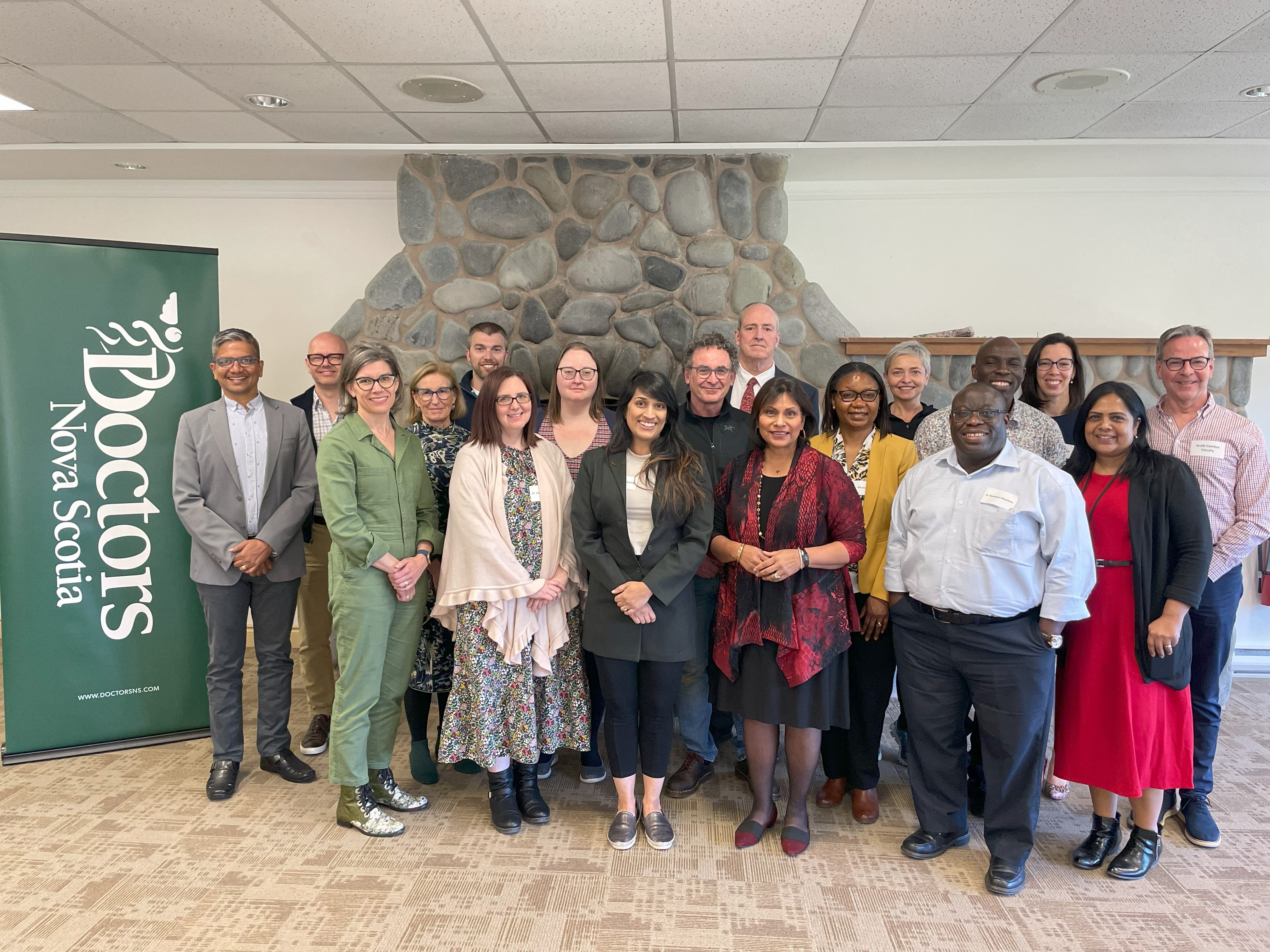- Dr. Andrew Harris
- Dr. Emmanuel Ajuwon
- Dr. Erica Schollenberg
- Dr. Heather Curtis
- Dr. Jillian Coolen
- Dr. Kris Srivatsa
- Dr. Kwamena Beecham
- Dr. Lesya Shuba
- Dr. Lois Bowden
- Dr. Mark Walsh
- Dr. Mark Bosma
- Dr. Matthew Clarke
- Dr. Mutiat Sulyman
- Dr. Nabha Shetty
- Dr. Sanjana Sridharan
- Dr. Sarah Rushworth
Cohort 5 Action Learning Projects
The fifth cohort of the PLDP completed the program in April 2023. A significant portion of their work was on action learning projects.

Action learning projects
Each group was tasked with an action learning project, which called on participants to create solutions to real-life issues in the health-care system.
1. Promoting health systems science
Project sponsor: Dr. David Anderson, Dean, Dalhousie Faculty of Medicine
Group members: Drs. Matthew Clarke, Andrew Harris, Erica Schollenberg, Lesya Shuba, Sanjana Sridharan and Mutiat Sulyman
About the project: The Dean’s Office at the Dalhousie University Faculty of Medicine has identified a need to better engage community-based physicians outside of the Halifax-based academic departments. There is a need both to recruit new distributed faculty members and to increase teaching commitments from current faculty.
The group explored these needs and identified 10 recommendations for the Faculty of Medicine:
- Create a role specifically dedicated to recruitment, engagement and development of distributed faculty.
- Collaborate with NSH to provide local academic/teaching administrative support within each zone.
- Provide faculty appointment information to newly licensed physicians.
- Create a communications strategy specifically targeting distributed faculty.
- Redevelop the faculty recruitment & development website.
- Develop an appropriate academic appointment and promotion career track for community-based clinical educators.
- Consider distributed faculty engagement from an equity, diversity, and inclusion perspective.
- Develop a teaching skills curriculum for distributed faculty and internationally trained faculty.
- Collaborate with DNS to advocate for better remuneration for teaching activities from the Department of Health and Wellness.
- Provide or negotiate other financial support to assist distributed faculty developing learning environments.
2. The silent epidemic of pelvic floor dysfunction
Project sponsor: Dr Baharak Amir-Wornell, Chief of Gynecology at IWK Health
Group members: Drs. Kwamena Beecham, Mark Bosma, Heather Curtis and Sarah Rushworth
About the project: This was were tasked with developing a provincial pathway for assessment and treatment for pelvic floor dysfunction.
The group created a new pathway that removes barriers and fully involves the patient. To ensure this pathway is a success, they recommended:
- Increasing education for family physicians, patients and physiotherapists.
- Identifying urologists and gynecologists across the province who can accept referrals and manage uncomplicated cases.
- Advocacy for funding and training of more pelvic floor physiotherapists for all zones.
- Improving patient access to MSI funding for physiotherapy through family physicians.
- Introducing travel clinics by urogynecologists for different zones if resources are available.
3. Physician burnout and restoring joy at work
Project sponsor: Dr. Nicole Boutilier, Vice-President of Medicine and Integrated Health Services, Nova Scotia Health
Group members: Drs. Emmanuel Ajuwon, Lois Bowden, Jillian Coolen, Nabha Shetty, Kris Srivatsa and Mark Walsh
About the project: Nova Scotia Health (NSH) asked this group to assess the variables and impact of burnout after three years of working through the COVID-19 pandemic. They were asked to make recommendations for restoring faith and hope in medicine, so physicians remain resilient and continue their career in the field.
The group assessed what brought Nova Scotian physicians joy at work, and what reduced their joy at work. They recommended that NSH do three things:
- Create a hotline for responsive, immediate IT and equipment support.
- Promote physician wellness by ensuring accessible spaces within health centres for physicians to be social, active and take time for nutritional breaks.
- Implement the recommendations made by the Office of Regulatory Affairs and Service Effectiveness to reduce physician administrative burden.
To read the full Action Learning Projects, contact Samantha Graham (see below).
